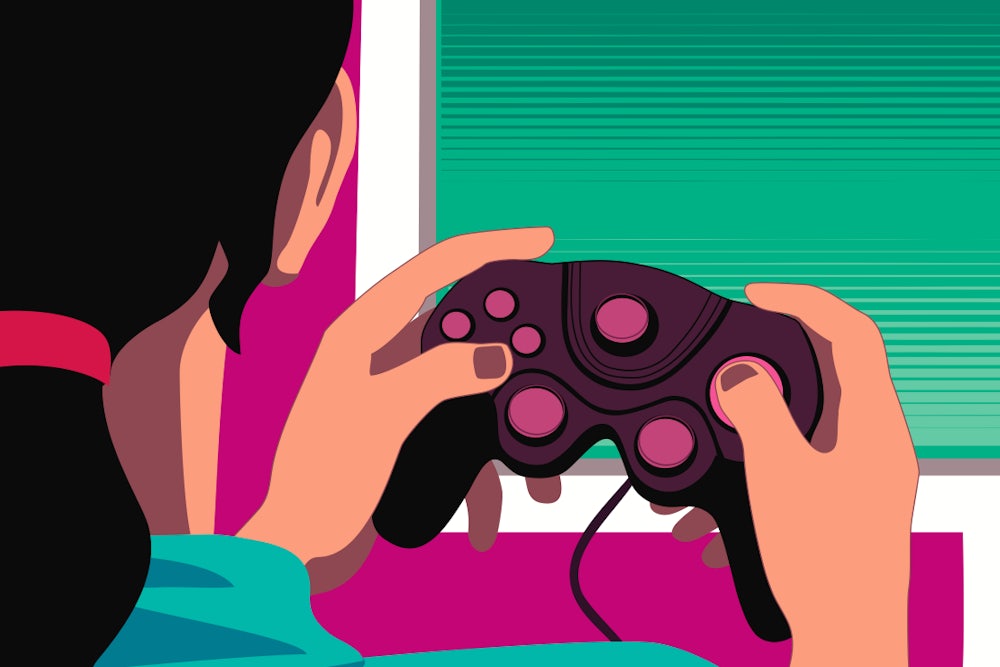Although women now make up almost half of all video game players, the gaming community remains, in some ways, hostile toward women.
For example, the GamerGate controversy, which began in 2014 and involved a harassment campaign against prominent female gamers, journalists and designers, reflected a longstanding undercurrent of misogyny and sexism in the community. In some cases, those who challenged the sexism found themselves threatened with rape or death.
There’s also the long-held stereotype that men are simply better gamers than women. Women gamers are often perceived as incompetent players who aren’t genuinely interested in the games but rather sign up to get attention. If a female gamer does play well, she’s often derided as a hacker – someone who cheats to gain an advantage – because “there is no way a girl can be that good.”
In a recent study, we set out to examine whether men really make better gamers than women and, if so, what drove the gender performance gap. Specifically, we wanted to compare how quickly men and women leveled up in Massively Multiplayer Online (MMO) games, which are online worlds where thousands of players develop characters, make friends, join groups, complete quests and slay dragons together.
If men are actually better gamers than women, they should advance to higher levels within the same amount of play time. But if they don’t progress any faster, this finding would help refute one of the most pervasive stereotypes that continue to exist in the gaming community.
Getting to the next level
Our research used anonymous server data from over 10,000 men and women in two MMOs, “EverQuest II” in the United States and “Chevaliers’ Romance III” in China. We knew each player’s actual gender through their account registration information.
When players finish quests and kill monsters in MMOs, they earn experience points. When experience points reach a threshold, the player ascends to the next “level,” which unlocks new abilities, skills and access to new content. As in most video games, levels indicate a player’s progress.
Naturally, players spending a lot of time in the game are likely to reach high levels. That is why the speed of leveling up, rather than the level itself, measures performance in our study.

Before getting to our findings, we want to point out a couple of things we took into consideration. First, players who had reached the top level in the games were excluded in our analyses. Because top-level players couldn’t advance any further, their rate of leveling up was essentially zero. We removed these players to avoid confounding our analyses, but this also meant that we were not able to measure gender differences between the most advanced players.
Second, our analysis recognized that the rate of leveling up slows down as players progress. For example, it would take a lot more time and effort for a level 60 player to level up than a level 30 player. Therefore, our analysis compared apples to apples by evaluating players’ performance only against others who were at the same level.
Contrary to the stereotype, we found that player gender itself does not cause performance differences. Instead, the perception of women as poor gamers is fueled by other factors. For example, we found that women spent less time playing overall than men and chose more assistive character classes, such as Priests, who fare better healing group members than fighting on their own. When we took such factors into account by statistically controlling them in the analyses, the gender performance gap disappeared; women advanced at least as fast as men did in both games.
We also realized that different players are interested in different aspects of MMOs, and a few of those differences may correlate with gender. There’s some empirical evidence that men tend to focus more on achievement in video games – leveling up rapidly, gaining in-game status and competing against others – while women are drawn to social interactions, whether it’s helping other players or forming long-term relationships.
This suggests that men should advance faster than women. However, we found the opposite: Women advanced at least as fast as men did. So taking into account different play motivations (which we were unable to do in this study’s analysis) likely only strengthens our conclusions.
Beyond video games
The stereotype that women are inferior gamers is not only false, but could also make women more easily discouraged and less likely to play in the first place. Of course, this gender performance stereotype exists in a number of other contexts. In the software development community GitHub, for example, women are perceived as worse coders than men.
Our research has notable implications for this important social issue. Studies have shown that video games can be an important gateway to science, technology, engineering and mathematics (STEM) fields. If stereotypes about girls and women are preventing them from playing, then it could potentially contribute to preexisting gender inequality and stereotyping in these fields.
One approach to dealing with this issue is to promote stereotype-free gaming experiences for women and girls through female-supportive gaming communities, such as the PMS Clan, one of the oldest and most renowned female-oriented gaming communities in the world. Scholars such as Gabriela Richard at Pennsylvania State University have found that members of these communities are more confident and perceive themselves as better gamers.
Game designers can also help. They have the ability to construct the games to make them less hostile and more welcoming to female players. For example, Riot Games established the Tribunal, a system that allows the player community to review reported bad behaviors from fellow players, and then vote on whether to punish the offender. Banned players also get a “reform card” with the details of the offense, as well as judgments from the Tribunal. So far, the Tribunal has significantly reduced online harassment.
While programs like Tribunal are a starting point in the larger battle to end gender stereotypes, our findings will hopefully allow female gamers to realize that, when it comes to inherent skill, they’re on a level playing field.
![]()
This article was originally published on The Conversation. Read the original article.
